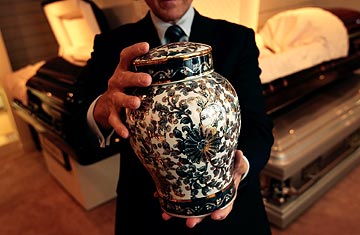
A funeral director holds a cremation urn in the showroom of his funeral parlor in New York City
(2 of 2)
Samuels, a retired police officer who has been with the medical examiner's office for 13 years, says he's never seen the situation this bad. "Some people just never had the money, but now we're getting people who at one time may have had the money to do this and they just can't. We have people losing their homes. People are finally feeling the economic strain completely. When people don't have jobs, you have people who can't eat, so burying someone is not high up on their list of what they have to do."
The dirge has the same tune in Vegas. P. Michael Murphy, Clark County coroner and president of the International Association of Coroners and Medical Examiners, says he's seen a definite uptick in the number of indigent burials owing to financial hardship in the past several months. "Our investigators are seeing an increase in families who as part of the initial shock they're going through are verbalizing to us, 'What am I going to do? I can't pay the rent. My car is being repossessed,' or whatever. 'Our finances are at the very limit,'" says Murphy. "This problem used to be unique to just indigents who either had no family or were living on the street or homeless. We are now seeing folks expressing this concern who are recently unemployed or their house is in foreclosure, so it's not just what you would typically think of being an indigent burial."
"Let's not forget that this is not just a financial issue," Murphy adds. "The sense that I get from our investigators is that when people are emotionally strapped already [because of their finances], this is almost like the icing on the cake. It sort of breaks their back. It's hard enough when you're dealing with the death of a loved one. Then add in all the additional social pressures that go along with it, and it can make things seem insurmountable."
At a time of increased demand, medical examiners' and coroners' offices around the country, like many other county agencies, are experiencing severe budget cuts that may only worsen the problem, says Dr. Jeffrey Jentzen, past president and chairman of the board of the National Association of Medical Examiners. Says Jentzen: "Every medical examiner I've talked to has had major cuts in financial support from the county that are going to start impacting service. I'm talking about cuts in the 20%-to-25% range across the nation." Jentzen worked as the chief medical examiner for Milwaukee County for 20 years before becoming a professor and director of forensic and autopsy services at the University of Michigan in Ann Arbor last year.
Even in locations like Milwaukee County, where the number of unclaimed decedents is holding steady, the numbers will likely swell if $300,000 is cut from burial assistance, as proposed for 2010 by the county's department of health and human services. The program currently offers up to $1,500 in burial assistance to low-income families. "I would guess it would at least triple the number of unclaimed bodies if burial assistance is cut, because families are just not going to have the money to take care of them," says Karen Domagalski, operations manager for the Milwaukee County medical examiner's office, which handles about 60 unclaimed bodies a year.
As a result of current or potential budget cuts, Jentzen says, some county jurisdictions may need to cut back or stop providing burial services for the unclaimed. "If counties can't do it because they're strapped," says Jentzen, "then I don't know where they're going to go."
